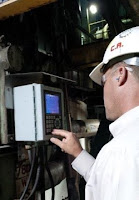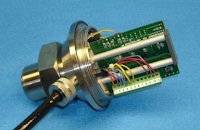In describing the characteristics and operation of process control instruments (such as process refractometers), it is very important to understand some common terms used in the industry. The definitions of some of the more common terms are provided below:
Accuracy: The closeness of an indicator or reading of a measurement device to the actual value of the quantity being measured; usually expressed as ± percent of the full scale output or reading.
Drift: The change in output or set point value over long periods of time due to such factors as temperature, voltage, and time.
Hysteresis: The difference in output after a full cycle in which the input value approaches the reference point (conditions) with increasing, then decreasing values or vice versa; it is measured by decreasing the input to one extreme (minimum or maximum value), then to the other extreme, then returning the input to the reference (starting) value.
Linearity: How closely the output of a sensor approximates a straight line when the applied input is linear.
Noise: An unwanted electrical interference on signal wires.
Nonlinearity: The difference between the actual deflection curve of a unit and a straight line drawn between the upper and lower range terminal values of the deflection, expressed as a percentage of full range deflection.
Precision: The degree of agreement between a number of independent observations of the same physical quantity obtained under the same conditions.
Repeatability: The ability of a sensor to reproduce output readings when the same input value is applied to it consecutively under the same conditions.
Resolution: The smallest detectable increment of measurement.
Sensitivity: The minimum change in input signal to which an instrument can respond.
Stability: The ability of an instrument to provide consistent output over an extended
period during which a constant input is applied.
Zero balance: The ability of the transducer to output a value of zero at the electronic null
point.
This blog focuses on industrial, inline process refractometers and their use in industrial applications. Refractometry is used to measure the refractive index of a substance in order to determine its composition or purity. Posts include information on theory, construction, installation, new products and new markets.
Electron Machine Corporation | Umatilla, FL | PHONE: 352-669-3101 | ElectronMachine.com
Process Refractometers Built to Handle the Toughest Conditions
Users agree. Electron Machine builds the most rugged process refractometer available for the pulp and paper, food and beverage, and chemical industries.
https://electronmachine.com
352-669-3101
https://electronmachine.com
352-669-3101
Process Refractometers for Food and Pharmaceutical Processing
Process refractometers provide the analysis to quickly, reliably, and very accurately identify a sample and determine it's concentration and purity levels. They measure the refractive index and temperature of flowing liquids, and apply mathematical functions to determine the concentration of dissolved solids.
Process refractometers are particularly useful in the food and pharmaceutical industries where they are used to optimize production processes, control quality, and ensure consistency and purity.
In commercial food applications such as juice production or tomato processing, refractometers are used to measure degrees Brix. The Brix scale relates refractive index to sugar concentration, and is a key way to maintain consistency. For example, process refractometers are used for the concentration process of fruit juices. The concentration process is normally achieved by removing water through evaporation, and by measuring Brix, the evaporation process can be controlled and related to the desired juice concentration.
In the pharmaceutical industry, process refractometers are used to monitor and control concentration levels during supersaturation, a critical process in crystallization. Crystallization is key to the purification of solids in pharmaceutical production. A high degree of measurement accuracy and reliability provided by the process refractometer ensures precise monitoring and control and a pure product.
There are many other industrial applications for process refractometers, almost all sharing the need for accurate solids content measurement.
For more information about process refractometers, contact Electron Machine. Visit them at https://electronmachine.com or call 352-669-3101.
Process refractometers are particularly useful in the food and pharmaceutical industries where they are used to optimize production processes, control quality, and ensure consistency and purity.
In commercial food applications such as juice production or tomato processing, refractometers are used to measure degrees Brix. The Brix scale relates refractive index to sugar concentration, and is a key way to maintain consistency. For example, process refractometers are used for the concentration process of fruit juices. The concentration process is normally achieved by removing water through evaporation, and by measuring Brix, the evaporation process can be controlled and related to the desired juice concentration.
In the pharmaceutical industry, process refractometers are used to monitor and control concentration levels during supersaturation, a critical process in crystallization. Crystallization is key to the purification of solids in pharmaceutical production. A high degree of measurement accuracy and reliability provided by the process refractometer ensures precise monitoring and control and a pure product.
There are many other industrial applications for process refractometers, almost all sharing the need for accurate solids content measurement.
For more information about process refractometers, contact Electron Machine. Visit them at https://electronmachine.com or call 352-669-3101.
Subscribe to:
Posts (Atom)

